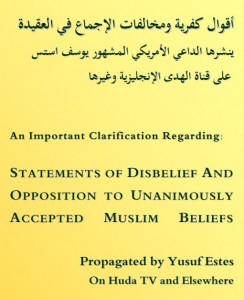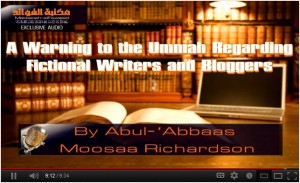
Version 2.0
Beware of the dangerous beliefs of Yusuf Estes! He has been spreading statements of disbelief about the Quran over the past 10 years or so – unchecked! He has openly propagated on Huda TV and other mediums:
- What is in the mus-haf is not considered Quran.
- The Mus-haf Represents the Real Quran in al-Lowh al-Mahfooth, like how paper money represents stored wealth.
- The written Quran is similar to sheet music for Christian hymns.
- The math-hab of the modern Raafidhah state of Iran, the Ja’fari math-hab, is a legitimate Islamic math-hab.
- The word “Shiite” has a known linguistic basis, but we don’t know where we got the word “Sunni” from.
- An Iranian Shiite Ayatollah is a “true scholar of Islam” (as he links his victims to the Ayatollah’s writings).
- George Bush’s (illegal) invasion of Afghanistan was justified by the Quranic order for jihaad.
And other statements of disbelief and innovation, aiding various deviations of old, as well as some newly invented ones.
Statements of the Scholars
Shaykh ‘Ubayd ibn ‘Abdillaah al-Jaabiree, retired professor at the University of al-Madeenah, warned the Muslims from this man, saying, “He is either astray, leading others astray, or he has lost his mind.” [Source]
Shaykh ‘Abdur-Rahmaan Muhyiud-Deen, another retired professor at the same university, said, “He is astray, leading others, astray… he doesn’t know anything about Islaam… The shaytan has spoken upon his tongue…” [Source]
The Free E-Book
In this e-book prepared for free and unlimited distribution you can:
- Read the actual statements of Yusuf Estes, word-for-word.
- Compare between his corrupt teachings and the pure understanding of Islam from the Book, the Sunnah, and the imaams of the Salaf.
- Find out what one of today’s scholars has said about him.
- Learn how to respond to false claims about his teachings and this clarification.
Download the e-book now, and equip yourself with knowledge of Islam, so you don’t fall for one of the many calls to innovation:
An Important Clarification Regarding Statements of Disbelief and Opposition to Unanimously Accepted Muslim Beliefs Propagated by Yusuf Estes on Huda TV and Elsewhere
To help spread awareness of this extremely important topic amongst your brothers and sisters in Islaam:
-
Send this e-book to your contacts.
-
Mention this article or the website
YusufEstesQuran.com in a comment under every video of Yusuf Estes you see on YouTube or elsewhere.
-
Encourage your local masjid to have a few printed versions of it in the masjid library.
-
Print it yourself and make copies for the Muslims you know that do not use the internet often or at all.
-
Encourage your local Muslim chaplain to print it and distribute it to the inmates he works with.
-
Encourage all Islamic website admins to upload a copy of the e-book and make it available for download.
Ahlus-Sunnah need to be united in the face of this serious calamity. A man has been spreading the beliefs of the Jahmiyyah Cult and worse amongst the ranks of the unsuspecting common Muslims. The issue here is Islaam vs. kufr, and your help is needed. Take a position for Allaah’s Sake alone, and help the Muslims shun obvious falsehood.
Be patient with the reactions of your brothers and sisters. Spread the clarification as much as you can, and avoid debates and arguments. For every person who will not leave their attachment to a personality for the ‘aqeedah of Ahlus-Sunnah, you will find others who will, so do not focus on those who insist on destroying themselves, rather work hard to reach the people who embrace guidance when it comes to them.
Important: Before using the “Leave a Reply” feature below, make sure you’ve read the entire e-book, especially the last two appendices called: “20 Responses to 20 Honest Concerns” (p.59-64) and “20 Responses to 20 Dishonest Claims” (pp.65-72).
Concerns that are addressed there will not be approved below. As a reminder of an essential principle in Islam (speaking only with knowledge), it is always important to read something entirely before commenting on it, especially a topic as important as this one.
If anyone honestly fears that Yusuf Estes has not been advised about this matter, then please be one more positive voice for change, and send him another copy personally to whatever email or contact information you have for him. Ask him to purify his intentions, read it carefully, and act on it with things that are pleasing to Allaah. We don’t want to get carried away defending an individual at the expense of our brothers and sisters not being able to distinguish between Islaam and disbelief!
Furthermore, while we do appreciate all the replies showing support and making du’aa’ for us and for Yusuf Estes (may Allaah guide him), comments that do not meet our requirements for comment approval will not be approved, and we seek your pardon and thank you for understanding.


 Shaykh Saalih al-Fowzaan (may Allaah preserve him) stated:
Shaykh Saalih al-Fowzaan (may Allaah preserve him) stated: